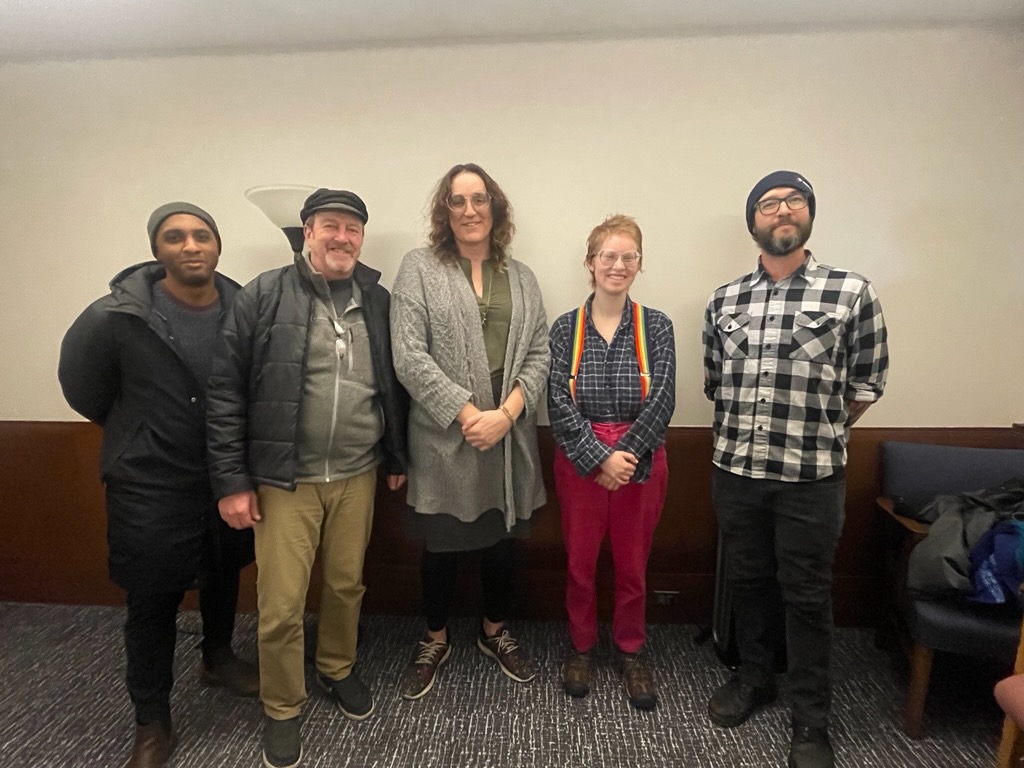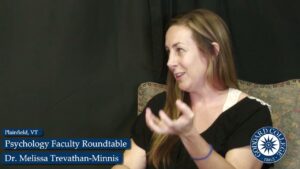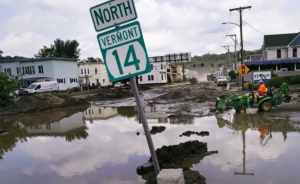
[In Fall 2020 all residencies will be held virtually.]
The sudden shift to remote instruction has caused a needed moment of critical interrogation in higher education. Colleges, universities, and the students that attend them are all making difficult choices about the Fall semester. At the heart of these decisions lies a question about the fundamental nature of education. Goddard College, a well-kept secret in the hills of Vermont, offers a radical alternative to online instruction. Goddard has been offering a unique form of remote learning since 1963. Its approach to education is suddenly incredibly relevant as debates open up around the value and nature of learning.
So what makes Goddard different? When I’m talking to a prospective student, the first things that come up are often the things that are absent. There are no courses. There are no grades. Students spend most of the semester working in their own communities, so it does not have the typical features of campus life. No sport teams. No frat parties.
To explain what the program offers, I’ll often make comparisons to things that are familiar. It’s a place where every student is doing independent study projects all the time. It’s a place where faculty give undergraduates the type of mentorship that universities typically reserve for doctoral candidates. These descriptions are always incomplete, though. They are a set up for the question that follows: What are you interested in learning? What projects are you interested in doing? What are you actually passionate about?
Instruction vs. Dialogue
Goddard’s entire undergraduate program is designed to engage students in sustained dialogue. Faculty work to deeply understand each student’s life circumstances, worldview, and educational aspirations. Then faculty support each student to co-create a curriculum that builds upon existing skills and develops new competencies and perspectives that will support them in meeting their own ambitious goals. The Goddard that each student steps into is already shaped by this dialogue the moment they get here.
In Pedagogy of the Oppressed, Paulo Freire writes:
No one can say a true word alone—nor can she say it for another, in a prescriptive act which robs others of their words. Dialogue is the encounter between [people], mediated by the world, in order to name the world.
Paulo Freire, Pedagogy of the Oppressed, 1970.
Freire critiques instructional models built on the transfer of information from an expert to a student. He refers to this as the “banking model” of education. Instead, he envisions a model grounded in the collaboration of a teacher and a student that solve real-world problems together. In this problem-solving dialogue, the teacher shares the knowledge and skills that they hold. At the same time, though, this conversation incorporates the knowledge that student brings as a whole person living in the world, enmeshed in culture, society, and history.

This approach is based in a radical idea. We believe that a student arrives in the educational process, not as an empty vessel, but as a participant in the world, ready to identify their own needs and design their own learning. In Teaching to Transgress, bell hooks reflects on the power of Freire’s work in her own learning:
There was this one sentence of Freire’s that became a revolutionary mantra for me: ‘We cannot enter the struggle as objects in order later to become subjects.’
bell hooks, Teaching to Transgress: Education as the Practice of Freedom, 1994.
Of course there are faculty in institutions across the country that strive to treat their students as peers and colleagues. The format of the classroom itself, however — the lecture, homework, testing, grades — imposes a power dynamic that prevents dialogue from transcending instruction. Goddard offers a different format altogether.
Alternative Structures for Learning:
There are many good reasons that most educational institutions center the delivery of information and the prescriptive instruction of skills. This approach creates uniformity in a labor force that is trained to solve problems in the same way. It develops obedience and an ingrained sense of the hierarchy of expertise. Lectures also offer an efficient business model. A single expert can communicate information to hundreds of students and assess their retention on a multiple choice test.
It is labor intensive to get to know each student individually. It takes time to get to know their backgrounds and ambitions, to sustain a dialogue that relates each text or activity to the evolution of their work. Dialogue requires curiosity, vulnerability, and care on the part of faculty. It also demands an investment of time that most institutions are not equipped or willing to support.
In most of Goddard’s undergraduate programs, students don’t take courses. Instead, each student is paired with an advisor each semester who works with them to plan Areas of Study. These are independent projects that address the college’s degree criteria. A musician, for example, might address their science requirement by researching acoustics and the physics of sound. They could address social sciences in another area of study by learning about the use of music in ritual and ceremony across different cultures. Their advisor helps them to design a bibliography of sources and an array of activities that will facilitate this learning, and then meets virtually with the student over the semester and provides written feedback on their work, drawing connections between the student’s experience and the new bodies of knowledge they are developing. This process culminates in an interdisciplinary senior thesis.
After an intensive 8-day residency in Vermont, students continue their work at home, in their own communities. [In Fall 2020, this residency will be a virtual experience, given our deep concern for the health of our students.] Originally designed for working adults, this low-residency model also grounds students’ education in relationships to place and people that extend beyond the college years.
Outcomes:
For all of its revolutionary aspirations, Goddard still exists in a capitalist landscape where education costs money. We have to think about the students’ investment of time and money and what the yields of this investment are.
Because Goddard nurtures and demands intellectual curiosity, independence and self-discipline, it prepares students for graduate work. Many have gone on to continue their studies at Berkeley, Brown, Smith, Harvard, CalArts, NYU, University College London, or the European Graduate Institute, or have continued to pursue their studies in Goddard’s graduate programs.
Students have also applied these skillsets as entrepreneurs. Undergraduate students at Goddard are often already working adults in the fields of design, agriculture, culinary arts, media, complementary medicine, carpentry, education or social work (to name a few). They use their time at Goddard to upskill and to understand their experience within broader contexts, trends, networks, and discourses. Some use their final year to design a business and transition seamlessly into a new stage in their career.
Given the undergraduate program’s sustained focus on social justice and decolonization, many students also go on to work in the non-profit sector, building and contributing to networks of support, advocacy, and social change. That might mean creating a green architecture NGO to help a community in Guatamala build a sustainable school. It could mean diversifying the practice and instruction of yoga, providing anti-oppression training, or countless other modes of change-work.
The Future of Learning
There is no doubt that the pandemic will have lasting effects on the field of education. In the current moment we face questions about remote learning and how education changes when it is mediated by technology. While many colleges, universities, and tech companies debate the best ways to deliver instruction online, Goddard College already has a well-tested model for offering dialogue-based, personalized learning.

Looking further into the future, it is clear that current moment is not merely an inconvenient disruption in educational delivery models. The pandemic has surfaced unsettling realities about economic disparity, structural racism, political instability, and social discord. It forces us to question conventional wisdom and invites us to imagine new ways that humans can coexist and collaborate for mutual health and safety. Now more than ever, we need pedagogies and educational models that do not merely repeat and reproduce the old answers to the old problems. We need modes of learning that do not teach uniformity and obedience to the systems that are failing us, but instead give us tools to critically examine and transform them.
Thinking about the change necessary to truly transform society, Freire writes:
A revolutionary leadership must accordingly practice co-intentional education. Teachers and students, co-intent on reality, are both Subjects, not only in the task of unveiling that reality, and thereby coming to know it critically, but in the task of re-creating that knowledge.
Paulo Freire, Pedagogy of the Oppressed, 1970.
We face an uncertain future. It has never been more important for us to use the tools we have to come together, to engage in dialogue, and understand each other. Away from the classroom, even on the flat surface of a Zoom call, we can stand shoulder to shoulder, using this thing called “education” to face the problems of tomorrow together.
________________________________________
Goddard College offers BA degrees in Sustainability, Education, Health Arts and Sciences, Psychology, and Individualized Studies, as well as BFA degrees in Socially Engaged Art and Creative Writing. If you are interested in completing your degree through this unique dialogue-based model please get in touch!
We look forward to meeting you.

Affiliation BA Sustainability
BFA Socially Engaged Art
Individualized Bachelor of Arts
Undergraduate Studies Program
Location Plainfield, Vermont







